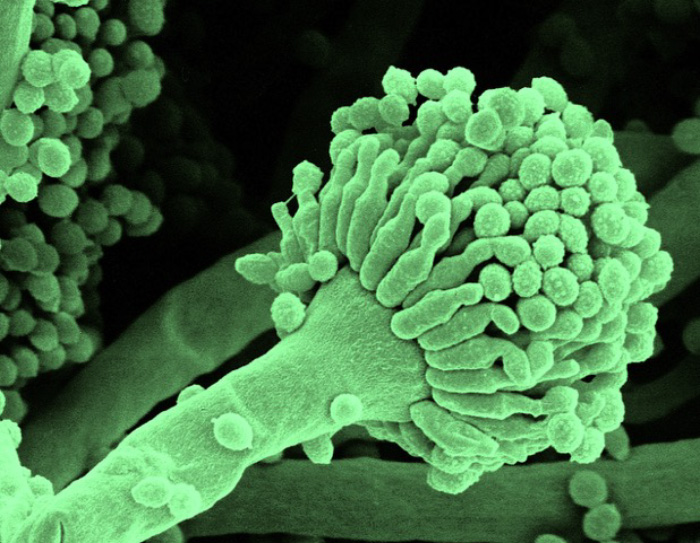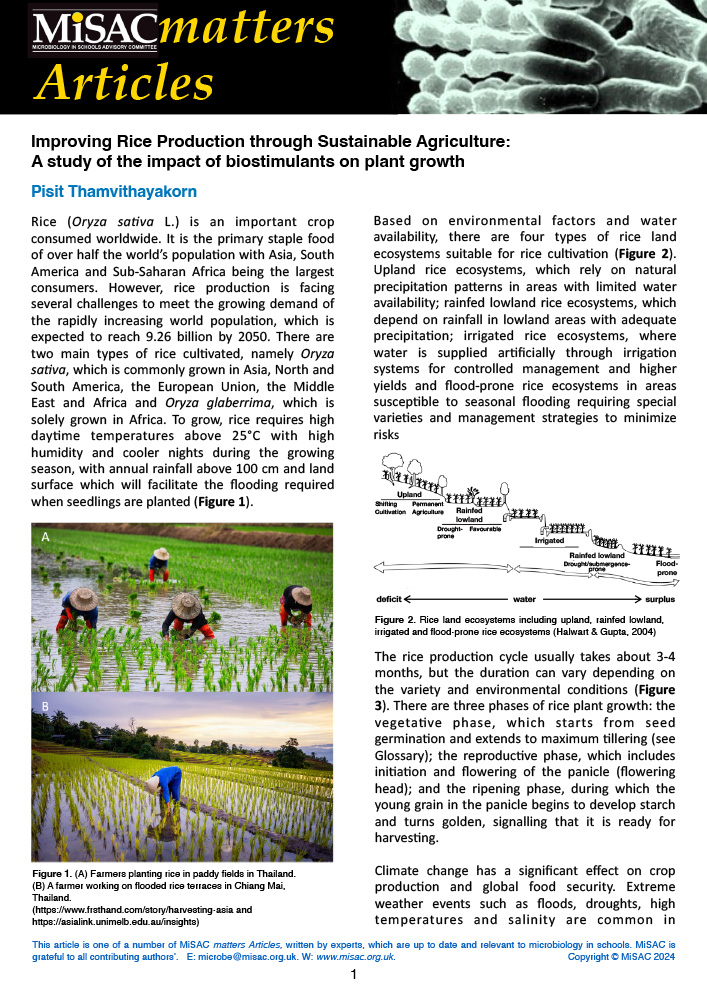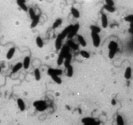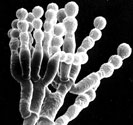|
|
| MiSAC News |
|
|
"Killer fungus will spread as climate heats up, experts warn" |
The topics chosen for the MiSAC competitions in 2024 (Neglected Tropical Diseases and climate change) and 2025 (Human Fungal Diseases) were spot on in highlighting global dangers as the world becomes hotter.
A recent study funded by the Wellcome Trust claims that the distribution of the Aspergillus fungal species flavus and fumigatus are predicted to increase by 16% and 77.5%, exposing a potential 1 to 9 million more people in northern Europe to infection. The rising resistance to antifungal drugs, together with limited diagnostic tests and treatments for fungal diseases, pose a threat to human health and food security as the planet warms, allowing pathogens to thrive in new areas.

Next year, the focus of the competition changes to an agricultural theme of milk production from cows, with the intriguing title: "How Microbes Make Milk". If you have never entered KS3 or KS4 students for this competition, they have to design an illustrated, web-page report for teenagers to raise their awareness of the roles of microbes in the production of milk by cows throughout the year. The competition closes on March 26th, 2026. Visit the Annual Competition page and download the competition publicity flyer. This will provide students with background information plus suggested website articles to help in their research of how microbes are involved. The entry form can also be downloaded from the competition page when the students have finished their work.
|
|
|
Fungi Connect |
The British Mycological Society has chosen October 4th 2025 as its UK Fungus Day. School children up to age 18 are encouraged to become inspired by fungi and to submit their own pieces of work to celebrate the fungal kingdom. The deadline for submissions to the BMS is October 15th 2025. Click on the Fungi Connect illustration to download the flyer.

|
|
|
New publications |
A new MiSACmatters article, 40, Improving Rice Production through Sustainable Agriculture: A study of the impact of biostimulants on plant growth, written by P Thamvithayakorn, has recently been issued.

|
|
| Microbes in the News
New Scientist occasionally prints stories of the activities of microbes which provide interesting reading. Printed here are résumés of recently-published articles. For subscribers, a link is provided to the original source.
|
|
| Gut reactions
Our microbiome – the trillions of bacteria, fungi and viruses that inhabit our body, mainly in the gut, – has been linked to good physical and mental health. For years, maintaining a healthy microbial diversity in the gut has involved the use of probiotics (live bacteria) and prebiotics (food for beneficial microbes). Now, consuming postbiotics (dead and fragmented microbes + chemicals that live microorganisms have secreted) is increasingly involved to keep us healthy. If the gut microbiome is likened to a natural pharmacy, the postbiotics are the medicines it dispenses.
A short-chain fatty acid, butyrate, is a metabolite produced when gut microbes consume indigestible fibre, and has a role in developing food tolerance in young children. It also reduces inflammation in bowel diseases and can help treat food allergies. Urolithin A (UA) is produced when gut microbes feed on foods such as walnuts, strawberries and pomegranates. UA helps maintain functioning mitochondria, which decline with ageing. It is now available as a food supplement to help older people with osteoarthritis. These and another postbiotic supplement which reduces the risk of cardiovascular disease and diabetes point to a future with exciting dietary possibilities.
Click here for the original article.
|
|
| Feed your immunity
Many foods claim to help your natural defences against infection; supermarket shelves are heaving with "immunity support" juices, teas and yoghurts. What should you eat to strengthen your immune system? Evidence suggests that you concentrate on your overall diet: a "Mediterranean" meal rich in vegetables, fruit, nuts and olive oil is healthier than a "Western" diet, loaded with sugars and saturated fats but low in fibre and vegetables. Your diet appears to affect the microbiome – the vast bacterial community that lives in our gut. A fast-food diet of burgers and fries increases inflammation, whereas the Mediterranean diet damps down these responses.
The fermentation action of the gut bacteria on a high-fibre diet produces short-chain fatty acids (SCFAs) which are anti-inflammatory. Eating larger amounts of fermented foods, such as kimchi, kombucha and yoghurts, increases a more-diverse microbiome and decreased markers of inflammation. Beneficial microbes such as Bifidobacterium influence immunity via the secreted SCFAs which bind to immune cell receptors and prompt them to release signals that favour immune restraint over reactivity.
Click here for the original article.
|
|
| A virus's link to causing multiple sclerosis
It has been suspected for some time that the common Epstein-Barr virus can trigger multiple sclerosis (MS). A study of 10 million military personnel in the USA has shown that virtually every case of diagnosed MS is preceded by an infection by the virus, which is spread via saliva, for example, in kissing. Initial infections by the virus may cause few, if any, symptoms but, once it enters the immune B cells, the virus lurks there permanently. Producing a vaccine against Epstein-Barr could reduce the incidence of MS.
Almost everyone has been infected by the Epstein-Barr virus so it is difficult to show that it is the trigger for MS. However, in the 10 million US personnel studied, 955 developed MS. Only one of the soldiers who developed MS tested negative for antibodies against Epstein-Barr.
Click here for the original article.
|
|
| Edible straws made by bacteria beat plastic and paper
Cellulose is produced by many types of bacteria when they feed on sugars. Researchers air-dried the cellulose and dipped it into sodium alginate, a carbohydrate found in algae. This fills in the holes in the cellulose structure that would otherwise absorb water. The alginate allows flat sheets of the bacterial cellulose to be rolled up into straws and hold its shape without glue.
The bacterial cellulose straws biodegrade faster than plastic, don't release microplastics and don't go soggy and bend which paper straws are prone to do. Because bacterial cellulose and sodium alginate are already used in food products, they are quite safe and edible. Compared with other biodegradable straws, these new bacterial products cost 0.3 US cents per straw - the same as plastic straws and one-tenth the cost of paper ones.
Click here for the original article.
|
|
| Long-haul fight
Alongside the 5.8 million people who have died from the Covid-19 virus, tens of millions more have long covid: a lingering condition with more than 200 symptoms that last for months or years. These include shortness of breath, post-exercise exhaustion and "brain fog". Many "long haulers" complain they have had little help from doctors. We now know that certain people are more at risk: if they have type 2 diabetes, if they have "autoantibodies" attacking their tissues, if pieces of the virus's genome are still circulating in their blood and if they have previously been infected with Epstein-Barr virus.
The theory of Covid viruses lingering in the body is supported by the reduction of symptoms when monoclonal antibody vaccinations are given to long covid sufferers. Evidence for immune disruptions is overwhelming with immune chemicals being overproduced, creating chaotic interactions in brain chemicals. Evidence is growing of the accumulation of "microclots" which restrict the flow of oxygen and nutrients to tissues and damages the walls of blood vessels. When drugs were administered to prevent the microclots from forming or to 'dissolve' them, the long covid symptoms of shortage of breath, fatigue and brain fog were reduced.
Click here for the original article.
|
|
| More than just a phage
Bacteria which cause food poisoning are a grave health risk, not least because many have developed resistance to antibiotics. The main concerns are salmonella, listeriosis, shigella and pathogenic strains of Escherichia coli. Bacteria-killing viruses, called bacteriophages, are now being used to destroy harmful microbes during food processing, stop food rotting to extend its shelf life or treat diseases on farms.
Bacteriophages are extremely common; an estimate of their number on Earth is 1031. They are sprayed as a mist over food which may have been contaminated by food-poisoning bacteria such as Listeria monocytogenes. A cocktail of different types is often required because each phage targets only one specific bacterial strain, so several are needed to deal with all the strains which might be present. The phages destroy the bacteria but are harmless to humans and do not affect the taste or texture of food, unlike treating food with ionising radiations.
In Belgium, a woman with severe leg injuries became infected with the bacterium Klebsiella pneumoniae that is resistant to almost all drugs. As a last resort, she was treated with phage therapy developed against this bacterium and, within weeks, the wound started to heal.
Click here for the first original article.
Click here for the second original article.
|
|
|
|
| Click here for archived news items
|
|
|
| |
|
|
|
|
|
|
| Blue tongue virus |
|
Pseudomonas fluorescens |
|
Oxytricha sp. |
|
Penicillium chrysogenum |
|
Microasterias sp. |
|
|
|
|
|
|
|
|
|
 |
|
 |
|
 |
|
 |
|
 |
|
|
